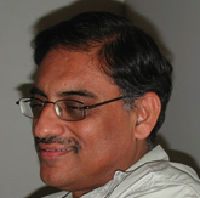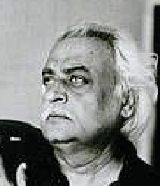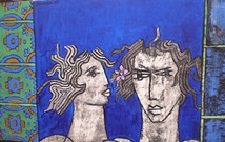Each time one visits Karachi the sprawling metropolis seems more run down. Crumbling infrastructure, notwithstanding the recent improvements, and a sense of neglect are apparent to any visitor.
Nevertheless the big city buzz and the pleasant mix of cultures, languages and dialects make it a fascinating place. The immense intellectual and cultural activity in the city is impressive. This mega-polis nurtures a wide array of people, ideas and movements confirming that Karachi’s future is not all that gloomy.
 Facing the thick wall of cynicism that cuts across Pakistani society, one is eager for signs and stories that allow us to see beyond that barrier. A case in point is the emergence of the Karachi study group, Miskeen Galli, organized by Afiya Zia, an essential Karachiite who was transplanted from Lahore years ago. Employed at a women’s group advocating for rights in Lahore, Afiya left the city after marriage. Many thought she had given up her cause. Now a mother of two sons, she has returned to her mission. Writing and researching full time, Afiya, with friends such as Akbar Zaidi and Khusro Mumtaz, established Miskeen Galli one year ago. The name is based on a commune, an alternative space created by artist Yusuf Bashir, where writers and artists converge. The group has attracted thirty members who convene each month to discuss new research in social sciences and deliberate on timely social and political issues.
Facing the thick wall of cynicism that cuts across Pakistani society, one is eager for signs and stories that allow us to see beyond that barrier. A case in point is the emergence of the Karachi study group, Miskeen Galli, organized by Afiya Zia, an essential Karachiite who was transplanted from Lahore years ago. Employed at a women’s group advocating for rights in Lahore, Afiya left the city after marriage. Many thought she had given up her cause. Now a mother of two sons, she has returned to her mission. Writing and researching full time, Afiya, with friends such as Akbar Zaidi and Khusro Mumtaz, established Miskeen Galli one year ago. The name is based on a commune, an alternative space created by artist Yusuf Bashir, where writers and artists converge. The group has attracted thirty members who convene each month to discuss new research in social sciences and deliberate on timely social and political issues.
Miskeen Galli now attracts Pakistani scholars abroad who find this forum useful for feedback and grounded perspectives on their academic work. Afiya is pleased with the group and its success. What is most remarkable is that this is not the only study group. Similar groups meet to discuss issues from Sufism to secularism in several parts of the city. Miskeen Galli has the ambition to pull together these disparate strands and give a holistic shape to such intellectual activity. Miskeen Galli is not the only gem in Karachi’s midst.
 The Karachi-based scion of Urdu literature, Dr. Asif Farrukhi is a much celebrated figure. A full time public health professional, he has managed to keep his passion for Urdu and world literature alive. He not only writes regularly but also publishes the literary journal Dunyaazad. He received the Prime Minister’s award for literature in 1995 for translating Latin American short stories into a collection entitled, Maut aur Qutub-Numa. In 2005, he was awarded the Tamgha-i-Imtiaz. Carrying forward the tradition of his grandfather Ahsan Farrukhi, a renowned author, and father Dr. Aslam Farrukhi, a faculty member of Karachi University’s Urdu Department, he has written several stories that were influenced by Karachi’s ethnic turmoil during the late 1980s and 1990s. These stories feature Karachi as a character undergoing a mental breakdown. His style is complex yet accessible. Asif also manages a publishing house and recently released a collection of Rumi’s ghazals translated by poet Fahmida Riaz.
The Karachi-based scion of Urdu literature, Dr. Asif Farrukhi is a much celebrated figure. A full time public health professional, he has managed to keep his passion for Urdu and world literature alive. He not only writes regularly but also publishes the literary journal Dunyaazad. He received the Prime Minister’s award for literature in 1995 for translating Latin American short stories into a collection entitled, Maut aur Qutub-Numa. In 2005, he was awarded the Tamgha-i-Imtiaz. Carrying forward the tradition of his grandfather Ahsan Farrukhi, a renowned author, and father Dr. Aslam Farrukhi, a faculty member of Karachi University’s Urdu Department, he has written several stories that were influenced by Karachi’s ethnic turmoil during the late 1980s and 1990s. These stories feature Karachi as a character undergoing a mental breakdown. His style is complex yet accessible. Asif also manages a publishing house and recently released a collection of Rumi’s ghazals translated by poet Fahmida Riaz.
 Anwar Maqsood is another artist who calls Karachi home. I visited with Anwar during my last stay in the City of Lights. We sat in his study, its walls flanked by portraits of the reflective Manto, a smiling Noor Jehan and the effervescent Begum Roshan Ara. Anwar Maqsood related several stories of his visit to Roshan Ara’s abode in Lalamusa and remembered her attraction to nature.
Anwar Maqsood is another artist who calls Karachi home. I visited with Anwar during my last stay in the City of Lights. We sat in his study, its walls flanked by portraits of the reflective Manto, a smiling Noor Jehan and the effervescent Begum Roshan Ara. Anwar Maqsood related several stories of his visit to Roshan Ara’s abode in Lalamusa and remembered her attraction to nature.
Maqsood has collected Subcontinental classical music since 1930. His television series “Kharaj-e-Tehsee n� introduces the achievements and influences of our great masters in literature, drama and poetry to the younger generations.
In the study with his daughter, Anju, son in law and dear friend, Atti, I listened to Maqsood discuss his latest project; a song he’s composed for the Pakistan pop-rock band, Strings, of which his son Bilal is a member.


Anwar is a cultural icon, and his contributions to music are as notable as his work as a painter. Many who know him through his television appearances are unaware of his talent in the visual arts. Anwar’s unique painting style fuses the modern and the traditional and negotiate the territory between. His figures speak a universal language, often locked in perpetual movement and living among local motifs. Anwar’s works have found a niche in the Pakistani art scene and are coveted by serious collectors.
Karachi, true to its cosmopolitan traditions, is marching forward. Never mind the flash floods after a heavy downpour. Infrastructure can be built. We need long term investment in ideas, collective deliberation; only then will social change occur. What cannot be bought is dynamism of spirit, which Karachi is fostering in drawing rooms, and cafés throughout the cityscape. If the vibrant spirit of the city is not there, the heavy infrastructure will be useless.
Raza Rumi is an international development professional and an avid literati. More can be found at Raza Rumi’s blog: Jahane Rumi.




















































Interesting article. But I wonder why out of all teh people in karachi doing good work these four are chosen. There are many others in teh perfomring arts with the galleries with Indus and so much more.
i totally agree. it is a struggle to death to keep the light from burning out !
Some literati may well be “alive and kicking” in Karachi, but sadly, the general atmosphere in our society is not conducive to unconventional thinking and critical attitudes among artists.
Despite that, we still have some gems of learning and culture, and I agree that we should support and uphold their work.
Nice post, Raza Rumi sahib.
The metropolis of Karachi is overcrowded and bursting at the seams. The civic sense is far from sight. The news media are at the mercy of political Mafia who is now in the Government. Those who oppose them are threatened. You will be well advised to read on line an article on the front page under the heading of ‘conflict between Dawn and the Governement.
The security situation is dire.
But, yes, the life goes on.
this is a patchy selective article and i have not seen raza at miskeen gali. other groups dont necessarily want to merge with miskeen. Asif is first rate – everyone should read him !